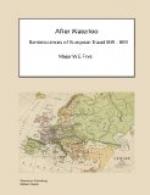of chickens’ livers, fish or vegetables fried.
Then an
umido or ragout of veal, fish with sauce;
and lastly, an arrosto (roast) of fowls, veal, game,
or all three. The
arrosto is generally
very dry and done to cinders almost. Vegetables
are served up With the
umidi, but plain boiled,
leaving it optional to you to use melted butter or
oil with them. A salad is a constant concomitant
of the
arrosto. A desert or fruit concludes
the repast. Wine is drank at discretion.
The wine of Lombardy is light and not ill flavored;
it is far weaker than any wine I know of, but it has
an excellent quality, that of facilitating digestion.
A cup of strong coffee is generally made for you in
the morning, for which you pay three or four
soldi
(sous), and in giving five or six
soldi to
the waiter, all your expenses are paid supposing you
are
spesato,
i.e., that the
vetturino
pays for your supper and bed; if not, your charges
are left to the conscience of the aubergiste, which
in Italy is in general of prodigious width. I
therefore advise every traveller who goes with a
vetturino
to be a spesato, otherwise he will have to pay four
or five times as much and not be a whit better regaled.
The
vetturini generally pay from three to three
and a half francs for the supper and bed of their
passengers. As the
vetturini invariably
make a halt of an hour and half or two hours at mid-day
in some town or village, this halt enables you to
take your
dejeuner a la fourchette, which you
pay for yourself, unless you stipulate for the payment
of that also with the
vetturino by paying something
more, say one a half franc per diem for that.
In this part, and indeed in the whole of the north
of Italy not a female servant is to be seen at the
inns and men make the beds. It is otherwise,
I understand, in Tuscany.
The whole appearance of the country from Asti to Alexandria
presents an immense plain extremely fertile, but the
crops of corn being off the ground, the landscape
would not be pleasing to the eye, were it not relieved
by the frequency of mulberry trees and the vines hung
in festoons from tree to tree. The villages and
farmhouses on this road are extremely solid and well
built. We arrived at Alexandria about twelve o’clock,
and after breakfast I hired a horse to visit the field
of battle of Marengo, which is in the neighbourhood
of this city, Marengo itself being a village five
miles distant from Alexandria. Arrived on the
plain, I was conducted to the spot where the first
Consul stood at the time that he perceived the approach
of Desaix’s division. I figured to myself
the first Consul on his white charger, halting his
army, then in some confusion, riding along the line
exposed to a heavy fire from the Austrians, who cannonaded
the whole length of the line; aides-de-camp and orderlies
falling around him, himself calm and collected, “spying
’vantage,” and observing that the Austrian
deployment was too extended, and their centre thereby
weakened, suddenly profiting of this circumstance
to order Desaix’s division to advance and lead
the charge which decided the victory on that memorable
day, which, according to Mascheroni:




